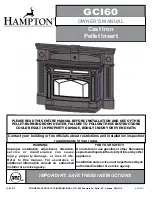
26
15. DISPOSAL INFORMATION
RIKA Innovative Ofentechnik GmbH is ensuring that its products
are eco-friendly throughout the product life cycle� This is why our
commitment for electronic products goes beyond the end of their
product life cycle�
Note
For proper disposal of the device, we recommend contacting a
local waste disposal company�
Note
Please contact your RIKA specialist dealer for professional
disassembly/dismantling of the device�
Note
We recommend that you remove the parts that come into contact
with the fire, such as glass, fire trough, grates, draught plates, baffle
plates, combustion chamber linings (e�g� fireclay), ceramics, ignition
elements, sensors, combustion chamber sensors and temperature
monitors and dispose of them in the household waste�
Information on the individual components
of the device
Q
Electrical or electronic components:
Remove the electrical or
electronic components from the device by disassembling them�
These components must not be disposed of in the residual waste�
Proper disposal should be carried out via the waste electrical
equipment take-back system�
Q
Fireclay in the combustion chamber:
Remove fireclay components
that have been installed in the combustion chamber from the
appliance� If present, fastening elements must be removed
beforehand� Fireclay components that come into contact with
the fire or flue gas must be disposed of; reuse or recycling is not
possible�
Q
Vermiculite in the combustion chamber:
Remove vermiculite
that has been installed in the combustion chamber from the
appliance� If present, fastening elements must be removed
beforehand� Vermiculite in contact with fire or flue gas must be
disposed of, reuse or recycling is not possible�
Q
Glass ceramic pane:
Remove the glass ceramic pane using a
suitable tool� Remove the seals and separate them from the frame
if present� Transparent glass ceramic can generally be recycled,
but must be separated into decorated and non-decorated panes�
The glass ceramic pane can be disposed of as construction waste�
Q
Sheet steel:
Disassemble the sheet steel components of the
device by unscrewing or flexing (alternatively by mechanical
crushing)� If present, remove the seals beforehand� Dispose of the
sheet steel parts as metal scrap�
Q
Cast iron:
Disassemble the components of the cast iron device
by unscrewing or flexing (alternatively by mechanical crushing)�
If present, remove gaskets beforehand� Dispose of the cast parts
as metal scrap�
Q
Natural stone:
Remove existing natural stone mechanically from
the unit and dispose of as construction waste�
Q
Gaskets (glass fibre):
Remove the gaskets mechanically from the
device� These components must not be disposed of with residual
waste, as waste glass fibre cannot be destroyed by incineration�
Dispose of gaskets as glass and ceramic fibres (artificial mineral
fibres)�
Q
Metal handles and decorative elements:
If present, remove or
dismantle metal handles and decorative elements and dispose
of them as metal scrap�
Note
Please observe the local disposal possibilities for all components�
Extract from the waste code of the
European Waste List Regulation
Waste code
Waste type
15 01 03
Wooden packaging
17 01 03
Tiles and ceramics
17 02 02
Glass
17 04 05
Iron and steel
17 05 04
Soil and stones
Electronic Waste
In accordance with the European Directive (2012/19/EU) Waste
Electrical and Electronic Equipment (WEEE) and other local
regulations, RIKA supports the setup of take-back systems and
recycling infrastructures�
Old devices can easily be returned to the municipal waste collectors
for recycling purposes� Please observe the national regulations to
that end�
The device may not be disposed of in the normal household waste�
Summary of Contents for Revivo 125
Page 1: ...Operating manual REVIVO 140 REVIVO 125...
Page 27: ...27 26 EN...



































